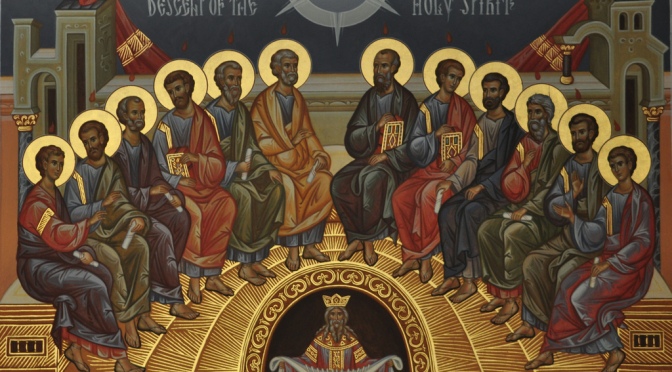The original movement behind modern Charismatic Christianity is Pentecostalism. The name “Pentecostal”, as we all likely know, comes directly from the second chapter of the Acts of the Apostles. In that chapter, on the day of Pentecost (referring to the fiftieth day after Passover), the early church received an amazing gift (charism): the Holy Spirit descended upon them. The Bible says:
When the day of Pentecost had come, they were all together in one place. And suddenly from heaven there came a sound like the rush of a violent wind, and it filled the entire house where they were sitting. Divided tongues, as of fire, appeared among them, and a tongue rested on each of them. All of them were filled with the Holy Spirit and began to speak in other languages, as the Spirit gave them ability (Acts 2:1-4).
The story of Pentecost is powerful. It testifies to us the importance of the Spirit in the church. However, we in the Pentecostal/Charismatic movement have a tendency to stop reading the chapter not long after this. We heavily emphasize spiritual gifts and revival, but we ignore the following verses in this chapter, in which the early church’s social dynamic is described to us.
As a Charismatic, I believe that the New Testament church should be the primary example for us to follow today. Of course, this cannot be done in every possible sense. English is our common language today, instead of Koine Greek, and we have digital printing instead of papyri. However, we can and should follow Christ and his apostles in spirit. In the Charismatic tradition, we strongly emphasize this point when it comes to spiritual gifts, but we seem to often neglect the socio-economic aspects of the church at Pentecost. Meanwhile, other Christian traditions often neglect both of these aspects of the apostolic church.
At the end of chapter 2, we have a wonderful explanation of the communal life these Christians lived:
They devoted themselves to the apostles’ teaching and fellowship, to the breaking of bread and the prayers. Awe came upon everyone, because many wonders and signs were being done by the apostles. All who believed were together and had all things in common; they would sell their possessions and goods and distribute the proceeds to all, as any had need. Day by day, as they spent much time together in the temple, they broke bread at home and ate their food with glad and generous hearts, praising God and having the goodwill of all the people. And day by day the Lord added to their number those who were being saved (Acts 2:42-47).
Pay special attention to verses 44 and 45 here, “All who believed were together and had all things in common; they would sell their possessions and goods and distribute the proceeds to all, as any had need.” The apostolic church held to a socio-economic practice of community of goods. This same teaching is confirmed a couple of chapters later:
Now the whole group of those who believed were of one heart and soul, and no one claimed private ownership of any possessions, but everything they owned was held in common. With great power the apostles gave their testimony to the resurrection of the Lord Jesus, and great grace was upon them all. There was not a needy person among them, for as many as owned lands or houses sold them and brought the proceeds of what was sold. They laid it at the apostles’ feet, and it was distributed to each as any had need (Acts 4:32-35).
Most people who are familiar with the Bible know that these passages are there. Usually, they dismiss it as a mistake. We know that the community of goods eventually faded away in the Jerusalem church. However, this same message is repeated elsewhere in the New Testament, which makes it difficult to simply dismiss.
First of all, we do have to ask where the apostles got the idea for community of goods. It is likely from John the Baptist and Jesus. John said, “Whoever has two coats must share with anyone who has none; and whoever has food must do likewise” (Luke 3:11), and Jesus echoed this teaching in Matthew 5:38-42, 6:19-21, and 19:21 (cf. Mark 10:21, Luke 18:22). We see an explicit mention of community of property in John 12:6. The evangelist states that Jesus and his disciples had a common purse, and in addition to that, the treasurer was Judas, who would betray him (which I think sends a clear message about the effects of money upon the soul).
In addition to these examples in the Gospels and Acts, we have testimony from other apostles about the importance of community of goods. 1 Corinthians 16:1-4 shows Paul collecting for a mutual aid fund between the churches (cf. Acts 11:27-30). This same principle also appears in 2 Corinthians chapters 8 and 9. In these chapters, Paul urges economic equality between those in the local church, and he then urges for a collection for a mutual aid fund between the churches. Paul’s emphasis is clear. There should be an economic equality among brothers and sisters in Christ:
Our desire is not that others might be relieved while you are hard pressed, but that there might be equality. At the present time your plenty will supply what they need, so that in turn their plenty will supply what you need. The goal is equality, as it is written: “The one who gathered much did not have too much, and the one who gathered little did not have too little” (2 Cor. 8:13-15).
It is commonly stated that this type of community only existed among the earliest apostolic Christians. It is also stated that this practice is no longer relevant for today. This is very similar to how Christians dismiss the gifts of the Spirit. They say that prophecy, tongues, or healings were intended for the apostolic church, and then these gifts ceased. However, just as with the gifts of the Spirit, the New Testament teachings on economics seem to be very relevant, and there is no Scriptural evidence that these practices were intended for a season. John Wesley makes this exact point in his commentary on Acts:
To say the Christians did this only till the destruction of Jerusalem, is not true; for many did it long after. Not that there was any positive command for so doing: it needed not; for love constrained them. It was a natural fruit of that love wherewith each member of the community loved every other as his own soul. And if the whole Christian Church had continued in this spirit, this usage must have continued through all ages. To affirm therefore that Christ did not design it should continue, is neither more nor less than to affirm, that Christ did not design this measure of love should continue. I see no proof of this.
Wesley is right. Not only did this practice continue and was intended to continue, but it is the natural fruit of Christian love. To have a church without community of property and mutual aid of some sort means that the church is likely spiritually unhealthy. Christian love is not being embraced in its fullness.
To confirm Wesley’s allegation that this spirit continued through the early church, I want to provide a few patristic sources below:
Thou shalt not hesitate to give, neither shalt thou murmur when giving; for thou shalt know who is the good paymaster of thy reward. Thou shalt not turn away from him that is in want, but shalt make thy brother partaker in all things, and shalt not say that anything is thine own. For if ye are fellow-partakers in that which is imperishable, how much rather in the things which are perishable (Didache 4)?
Thou shalt love thy neighbor more than thine own soul. . . . Thou shalt make thy neighbor partake in all things, and shalt not say that anything is thine own. For if ye are fellow partakers in that which is imperishable, how much rather shall ye be in the things which are perishable (Epistle of Barnabas 19).
We who formerly treasured money and possessions more than anything else now hand over everything we have to a treasury for all and share it with everyone who needs it (Justin Martyr, The First Apology 14).
One in mind and soul, we do not hesitate to share our earthly goods with one another. All things are common among us (Tertullian, Apology 39).
It is clear that the community of property was an essential aspect of the Christian ethic. It was the natural extension of the commandment to love our neighbors.
The Pentecostal/Charismatic tradition is one of revival. We look back to the New Testament, and we attempt to bring that same power of the Kingdom back today. The early Pentecostals were commonly criticized for their use of spiritual gifts, egalitarianism, and pacifism. All of these things were part of the New Testament example, which they wanted to return to. Unfortunately, one area that was not given as much attention as the others is community of goods (and economic equality generally). In addition, much of the Pentecostal/Charismatic movement later lost many of these New Testament imperatives. Today, we need to call attention to this ancient Christian tradition of radical community again.
 Pentecostals & Charismatics for Peace & Justice is a multicultural, gender inclusive, and ecumenical organization that promotes peace, justice, and reconciliation work among Pentecostal and Charismatic Christians around the world. If you like what we do, please join our Facebook forum, and sign up for our newsletter!
Pentecostals & Charismatics for Peace & Justice is a multicultural, gender inclusive, and ecumenical organization that promotes peace, justice, and reconciliation work among Pentecostal and Charismatic Christians around the world. If you like what we do, please join our Facebook forum, and sign up for our newsletter!


Are we as Pentecostals afraid to use terms like communism when discussing the early church?
LikeLike
Excellent article!
LikeLike
Reblogged this on Jerry A. Hudson.
LikeLike
Thanks for sharing it on! I’m glad you liked it, and I’m sure Kevin is too. 🙂
LikeLike
Thank you for ssharing this
LikeLike